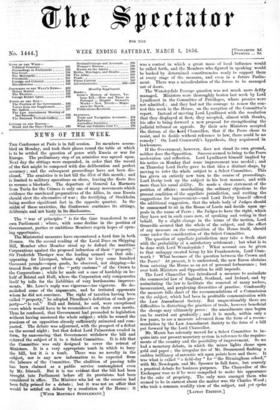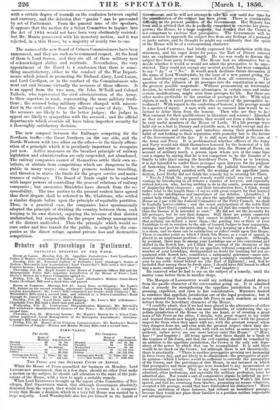The "war of principles" is for the time transferred to
our own Parliament ; where, with some decline in the position of Government, parties or ambitious Members regain hopes of open- ing opportunies.
The Ministerial measures have encountered a hard fate in both Houses. On the second reading of the Local Dues on Shipping Bill, Member after Member stood up to defend the maritime Corporations against the proposed infraction of their "property." Sir Frederick Thesiger was the leading counsel on that side ; appearing for Liverpool, whose right to levy some hundred thousand pouuds—upon goods, he observed, not shipping—he traced from the grant of the "petty customs" of the Crown to the Corporations ; while he made out a case of hardship on be- half of Bristol and Hull, 'where the Corporation only compensates itself by tolls for the liabilities of very burdensome improve- ments. Mr. Lowe's reply was vigorous—too vigorous. He de- molished some of the arguments, and he imitated opponents whom he did not convince. The right of taxation having been called." property," he adopted Pioudhon's definition of such pro- perty—" le vol." Hull and Bristol, he said, were exceptional eases which would have to be reconsidered on their own merits. Thus he confessed, that Government had proceeded to legislation without having mastered the whole subject; while he roused the passions of an opposition already sufficiently animated and com- pacted. The debate was adjourned, with the prospect of a defeat on the second night ; but that defeat Lord Palmerston evaded in form, by announcing that Government withdrew the bill and referred the subject of it to a Select Committee. It is felt that the Committee was only designed to cover the retreat of Ministers. It is a very appropriate tomb in which to bury the bill, but it is a tomb. There was no novelty in the subject, nor is any new information to be expected from the labours of the Committee. The abolition of passing tolls has been claimed as a public service contemplated even by Mr. Disraeli. But it is too evident that the bill had been brought into Parliament before all its provisions had been considered in office. The Minister who led on the occasion had been fully primed for a debate ; but it was not an affair that would be settled on debate by a resolution of the House : it
was a contest in which a great mass of local influence would be called forth, and the Members who figured in speaking would be backed by determined constituencies ready to support them at every stage of the measure, and even in a future hulk:- ment. There was a miscalculation of the forces to be managed out of doors.
The Wensleydale Peerage question was not much more deftly managed. Ministers were thoroughly beaten last week by Lord Lyndhurst in the Committee of Privileges, where proxies were not admitted ; and they had not the courage to renew the con- test this week in the House, on the reception of the Committee's report. Instead of meeting Lord Lyndhurst with the resolution that they displayed at first; they accepted, almost with thanks, his offer to bring forward a new proposal for strengthening the judicial tribunal on appeals. By their acts Ministers accepted the dictum of the Lord Chancellor, that if the Peers chose to resist, and to decide without reference to law, there could be no remedy ! On Lord Cranworth's hypothesis, they acquiesced in lawlessness.
If the Government, however, does not stand its own ground, neither does the Opposition. Success seemed to bring to the Peers moderation and reflection. Lord Lyndhurst himself implied by his notice on Monday that some improvement was needed ; and on Thursday Lord Derby gave to that idea a distinct shape, by moving to refer the whole subject to a Select Committee. This has given an entirely new turn to the course of proceedings Lord Derby took up the subject in his best manner, and with more than his usual ability. He made a clear statement of the position of affairs ; marshalling the ordinary objections to the present condition of the appellate jurisdiction, and reciting the suggestions for improvement—and Lord Derby himself offered the additional suggestion, that the whole body of Judges should be summoned to sit in the House of Lords and decide upon ap- peals in the name of Peers ; the Judges to have the right, which they have not in such cases now, of speaking and voting in that behalf. By a slight change in the terms of the motion, Lord Granville secured that the whole of the subject, and the effect of any measure on the composition of the House itself, should come under the consideration of the Select Committee.
The question of appellate jurisdiction may take a fresh start with the probability of a satisfactory settlement ; but what is to be done with Lord Wensleydale? What account can be given to that unhappy created being by his Frankenstein, Lord Cran- worth ? What becomes of the question between the Crown and the Peers? At present, it is understood, the new Baron abstains from entering the House as an act of personal forbearance ; but over both Ministers and Opposition he still impends.
The Lord Chancellor has introduced a measure to assimilate the commercial law of England, Scotland, and Ireland, and by assimilating the law to facilitate the removal of many useless, inconvenient, and perplexing diversities of practice. Confessedly the measure falls short of the recommendations of a Commission on the subject, which had been in profitable communication with the Law Amendment Society. But unquestionably there are difficulties in disturbing the practices of trade, however beneficial the change may ultimately prove : the amendments once begun can be carried out gradually ; and it is much, within only a few years, to see a measure advanced from the form of a recom- mendation by the Law Amendment Society to the form of a bill put forward by the Lord Chancellor. Mr. Muntz has solemnly moved for a Select Committee to in- quire into our present monetary system in reference to the require- ments of the country and the possibility of improvement. So we had a monetary debate, in which the minor lights shone upon gold and paper ; the irregular fire of Mr. Drummond flashing a sudden brilliancy of sarcastic wit upon points here and there. It was what is called "a field-day" for "the Birmingham school," with Mr. Newdegate and Mr. Spooner in full force, but scarcely a practical debate for business purposes. The Chancellor of the Exchequer rose as if he were compelled to make his appearance for the sake of propriety. The only man amongst them who seemed to be in earnest about the matter was Sir Charles Wood ; who took a common worldly view of the subject, and yet spoke
with a certain degree of warmth on the confusion between capital and currency, and the delusion that " panics " ean be prevented by act of Parliament. From the general tone of the speakers, it appears that the motion for a Select Committee to inquire into the Act of 1844 would not have been very obstinately resisted: but Mr. Muntz persevered with his monetary motion, and it was rejected, in a thin House, by a majority of nearly two to one.



































